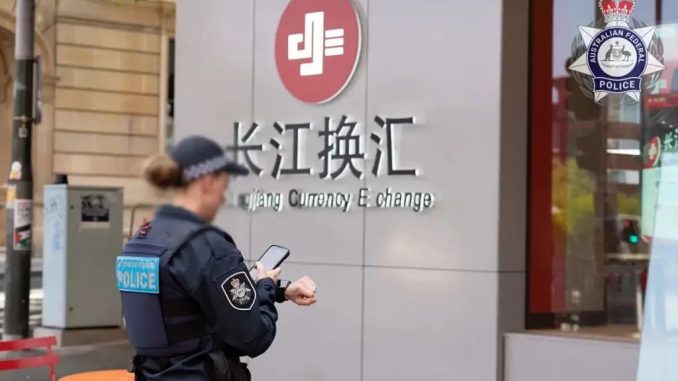
Our weekly roundup of news from East Asia highlights the most important developments in the industry.
The biggest money laundering scam exposed in Australia
Changjiang Currency Exchange, a money transmitter business based in Australia, has been caught in a $145 million ($230 million Australian dollars) money laundering scandal.
On 26 October, a 300-strong police operation spanning Melbourne, Sydney, Brisbane, Adelaide and Perth arrested seven people – four Chinese nationals and three Australian nationals – following a 14-month investigation.
Operating under a legitimate currency exchange business, police say Changjiang Currency Exchange allegedly helped clean dirty money and tainted cryptocurrencies from investment scams and unregistered crypto exchanges.
In one incident, a 37-year-old Chinese national was accused of using Changjiang’s services to launder A$63 million (A$100M) of funds obtained from a multinational Ponzi scheme.
Australian Federal Police are investigating Changjiang Currency Exchange (AFP)
The investigation began after law enforcement officers observed irregular traffic at Changjiang kiosks across Australia during strict COVID-19 related lockdowns. Police have since seized A$13.27 million (A$21 million) in cash and various luxury items believed to have been purchased with the proceeds of crime. Investigation is ongoing.
Bitgate’s Colorful Q3
Crypto derivatives exchange Bitget has become the fourth largest by volume, trailing only Binance, OKEx and Bybit.
As per the October 20 report, Bitget claims its market share has increased to 9.43%, whereas it was negligible two years ago. During the third quarter of 2023, the exchange says it onboarded more than 9,000 traders with 85,000 followers or copy-traders, who collectively achieved a net trading profit of $6.7 million. However, combined industry trade activity fell 23% year over year to $4.8 trillion in the quarter.
From July to September, Bitget’s user security fund peaked at $368 million and is now at $350 million. The exchange claims to have no debt with a proof-of-reserve ratio of over 200%. In September, the firm launched a $100 million EmpowerX fund dedicated to ecosystem development and hosted an eponymous summit in Singapore. It also hired 60 employees in July for its Middle East expansion plans.
 Bitget’s derivatives trading volume has been increasing year on year. (bitgate)
Bitget’s derivatives trading volume has been increasing year on year. (bitgate)
read this also
features
Play2Earn: How blockchain can bring a paradigm shift in building game economies
features
Are DAOs Overhyped and Dysfunctional? lessons from the front lines
China partially lifts the ban on NFTs
After a year of a harsh crackdown on private blockchain enterprises, China appears to have softened its stance somewhat.
According to local news reports on October 25, Chinese internet conglomerate Alibaba’s flagship peer-to-peer marketplace Jianyu (literally ‘bore fish’) has lifted censorship of “non-fungible token” related keywords in its search tool and Topnode NFTs. The collectibles have been re-listed. Built on Alibaba’s Ant blockchain.
Due to regulatory uncertainty, Topnode digital collectibles were banned from being listed on secondary markets. Last December, Cointelegraph reported that the Chinese government’s official NFT trading platform was planned to launch this year. The exchange is still in development at the time of publication. Since 2021, China has officially banned almost all crypto-related activities save for full ownership of cryptocurrencies.
Blockchain connects interprovincial health insurance in China
Residents in Shanghai, Zhejiang, Jiangsu and Anhui provinces can now submit and validate their health insurance claims using blockchain technology.
In partnership with Alibaba’s Ant Insurance, users in the above areas can submit their claims online, and receive their reimbursement within hours, following blockchain verification for authenticity.
In one example, a man identified only as Mr. Wang submitted his claim for lung cancer treatment in Anhui, and received the full $17,800 (130,000 Chinese yuan) reimbursed within two hours. Su Fang, director of the Institute of Financial Insurance at Shanghai University of Finance and Economics, commented:
“This time, all electronic financial and medical bills in the Yangtze River Delta have been opened up and extensively applied in commercial insurance claims, marking the true application of the digital Yangtze River Delta construction. “This not only brings real convenience to people, but also improves the efficiency of insurance claims and effectively prevents moral hazard.”
Ant Insurance has operated a blockchain-powered claims portal since 2019. Over the past four years, the platform has processed more than 2.25 billion medical claims and improved information sharing between insurance providers and medical professionals.
 China has softened restrictions on NFT platforms to allow related searches. (wechat)
China has softened restrictions on NFT platforms to allow related searches. (wechat)
Huaian uses blockchain to improve surveillance
Jianpu People’s Court of Huai’an City is using a combination of AI recognition, big data and blockchain technology to improve law enforcement surveillance.
From October 25, the Jianpu People’s Court will create an “all-purpose” system to monitor visitors entering and leaving the court premises. As soon as any visitor is identified encroaching into the unauthorized area, the system will alert the court bailiffs for their immediate arrest. Officials say the system can significantly reduce patrolling in tightly monitored areas:
“In public rest areas outside the court walls and outside the courtroom of the main building, etc., intelligent behavior analysis technology is used to capture and intelligently analyze the behavior of the parties, providing early warning of potentially dangerous behaviors such as abnormal May go.” gatherings, vigorous exercise, fights, etc., and remind the judicial police and other staff to pay attention and deal with it promptly and appropriately.”
Through this system, court bailiffs will have access to the activities and details of all visitors within the court premises. Augmented reality will also enhance hard-to-see areas for better resolution.
subscribe
The most fascinating reading in blockchain. Delivery is made once a week.


zhiyuan sun
Zhiyuan Sun is a journalist at Cointelegraph who focuses on technology-related news. He has many years of experience writing for major financial media outlets such as The Motley Fool, Nasdaq.com, and Seeking Alpha.
Source: cointelegraph.com


